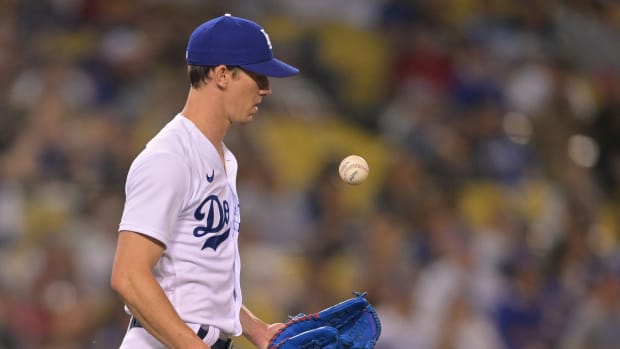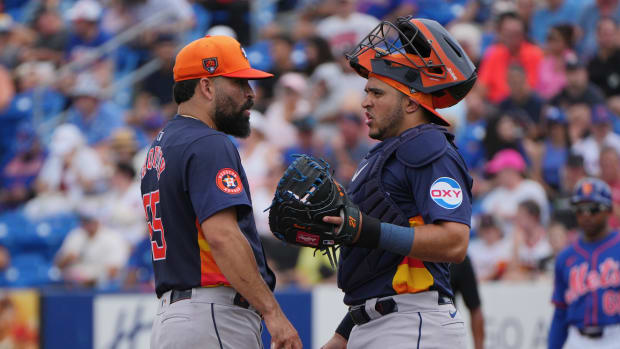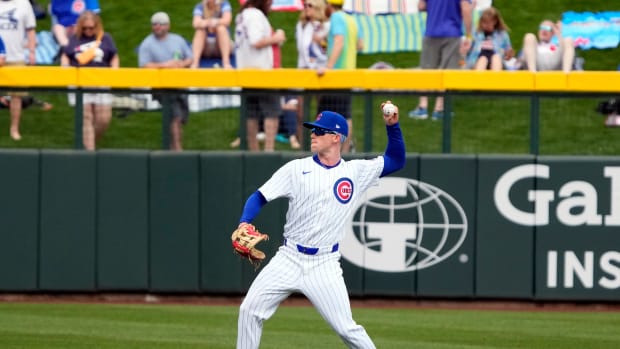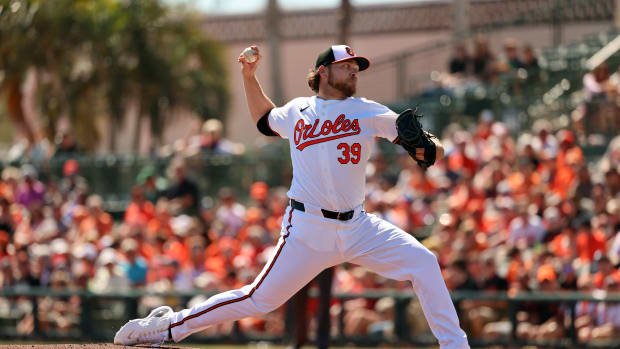A-Rod, game take another severe hit with latest PED allegations
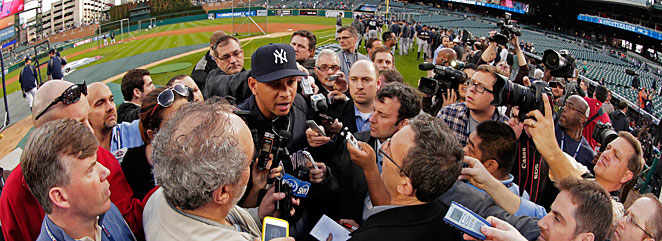
Alex Rodriguez once again finds himself at the center of a storm surrounding steroids, and he will have to answer questions about it.
/AP
The tale Alex Rodriguez wove in spring training of 2009, upon being identified by Sports Illustrated as one of the 103 players who flunked baseball's survey drug testing in 2003, was that he was but a naïf caught up in a "loosey, goosey" steroid culture and used drugs he couldn't remember or could barely pronounce only from 2001-03 -- a careful, narrow window that predated his tenure with the Yankees and baseball's penalties for usage. So slick was Rodriguez that not once did he even use the word "steroids."
Today the Miami New Times, a weekly publication, presents a much more conniving picture of Rodriguez, as well as five other baseball players, as someone who delved deep into the world of performance-enhancing drugs even in the immediate aftermath of that 2009 contrition and baseball's tougher drug policy. He is portrayed as a serial doper.
The Miami New Times obtained from a former employee of a Miami "wellness" clinic what it said are the personal notebooks of Anthony Bosch, the director of the since-shuttered Biogenesis clinic who was not licensed to practice medicine in Florida. The notebooks contain the names of customers, either in code name or by recognizable names, and their detailed doping regimens. The baseball names are Rodriguez, Toronto outfielder Melky Cabrera, Padres catcher Yasmani Grandal, Rangers outfielder Nelson Cruz, Nationals pitcher Gio Gonzalez and former Padres pitcher Cesar Carillo.
Those notebooks offer a trove of information about modern doping in all sports. They detail how and why testing alone doesn't stop the cheaters. They now hold the key to not only a possible criminal case, but also to the 2013 pennant races -- suspensions could be forthcoming -- and whatever shred of credibility is left to Rodriguez's baseball and personal legacy.
The next phase of this story is to hear from the players, none of whom commented to the Miami New Times when given the chance, as they scramble for a defense strategy that makes the truth as undetectable as they believed the PEDs to be.
On Tuesday afternoon, Rodriguez's publicist released a statement, which read: "The news report about a purported relationship between Alex Rodriguez and Anthony Bosch are not true, He was not Mr. Bosch's patient, he was never treated by him and he was never advised by him. The purported documents referenced in the story -- at least as they relate to Alex Rodriguez -- are not legitimate."
But the bigger shoe to fall is the one belonging to commissioner Bud Selig. The notebooks of Anthony Bosch are figuratively on his desk at this very moment. The man who in union with the players association has crafted the toughest anti-PED policies in pro sports has the power to suspend the players even without a positive test.
Under section 7.G.2 of the Joint Drug Agreement, the commissioner can rule for disciplinary action against a player for "just cause" in the cases of violations not specifically referenced in the JDA. Prescriptions and records of PED use and purchase fall under the "just cause" umbrella.
In 2009, for instance, Manny Ramirez entered an appeal of a test that showed an elevated level of testosterone. When an investigation of that appeal turned up a prescription from a doctor for a banned substance, Ramirez dropped his appeal and accepted the 50-game suspension. Ramirez was not banned because of the test, which technically was not entered as a positive, but because of the records of his prescription for hCG, a female fertility drug often used to kickstart testosterone production after steroid cycles.
Ramirez's doctor? Pedro Bosch, the father of Anthony Bosch.
It was that same year, 2009, that Rodriguez was using Anthony Bosch's cocktails of PEDS, according to the Miami New Times. Rodriguez, who turned 34 that year, returned surprisingly fast from hip surgery to bat .286 with 30 home runs and 100 RBIs while helping to the lead the Yankees to the world championship. A notoriously poor postseason player for the Yankees, Rodriguez batted .365 that postseason. Rodriguez also had been treated post-surgery by Anthony Galea, a Canadian doctor who pleaded guilty in 2011 to bringing unapproved drugs, including HGH, into the U.S. to treat athletes.
The Bosch notebooks contain information about Rodriguez's doping regimen from 2009 through 2012, including the drugs, payments and schedules. The banned substances include HGH, IGF-1, and creams and "troches," a type of drug lozenge, that contain testosterone.
The notebooks refer to Rodriguez by name and also by the code name "Cacique," a term originally referring to Caribbean tribal chiefs but has come to be used to describe local political or street bosses with excessive power -- a corrupt leader.
Major League Baseball is not terribly surprised by the breaking news, especially with Rodriguez, Cabrera, Grandal and Colon all previously having been tied to failed tests and synthetic testosterone previously identified as the drug of choice of cutting edge cheats. The inclusion of Cruz and Gonzalez were new developments.
Cruz was a journeyman with his fourth organization before he had a breakout season with Texas at age 28 in 2009. His connection to Bosch harms the reputations of all such players with late breakouts, leaving a cynical fan base to wonder if drugs are in play for such stories.
Gonzalez, who attended high school in Miami, is 52-29 over the past three seasons with Oakland and Washington. Lengthy suspensions for Cruz and Gonzalez would greatly impact Texas and Washington, respectively, two playoff clubs from last year with World Series aspirations.
Baseball's Department of Investigation, in cooperation with federal authorities, has been looking into the wellness clinics of South Florida for months. A major league source said MLB has been tracking all positive tests in the past year or more to look for any common denominators in terms of geography, trainers, suppliers, etc. The Miami area kept coming up as a possible main vein of the PED trade, and MLB investigators were focused on the area. The MLB Department of Investigation is a direct response to recommendations outlined by former senator George Mitchell in his 2007 report on steroids in baseball. Carrillo and Grandal attended the University of Miami and Cabrera and Rodriguez live in Miami.
The revelations also make abundantly clear why MLB and the players association tightened their testing protocols only weeks ago. What Bosch and his clients did from 2009-12 was to use cutting edge science to jump through loopholes of an outdated testing system. Though HGH was banned, for instance, baseball did not test for it until last year -- and only then as one announced test when a player arrived at spring training. Moreover, drug cheats could pass tests as long as they used transdermal, fast-acting testosterone-packed creams that elevate testosterone levels but can go undetected in tests as quickly as 24-48 hours.
Bosch and his clients were only the latest in a long line of stories of how every advance in testing begets another advance in cheating. Baseball moved to close such loopholes by instigating in-season random blood testing for HGH -- the first for any North American sport -- increasing the more sophisticated radio-isotope urine tests, and adopting so-called "longitudinal" testing protocols in which labs keep a baseline testosterone level on players. Any noticeable spike in the level would trigger an inquiry and more sophisticated tests. It was this kind of "bio-passport" testing that caused disgraced cyclist Lance Armstrong to say during his recent confession of drug use that testing in his sport became much tougher to beat.
The union and MLB moved quickly toward the adoption of such tougher protocols as more major league and minor league players were getting caught for using synthetic testosterone. The investigations into the South Florida clinics ran on parallel tracks to those concerns.
Likewise, the strange events surrounding Rodriguez's second hip surgery will bring about questions about his involvement with Biogenesis. Rodriguez had no problems with his left hip before a complaint about his right hip, the one surgically repaired in 2009, eventually led to the diagnosis that he would need surgery on his left hip. That surgery was postponed for nearly two months for "pre-habilitation" in order to better prepare the area for the rigors of recuperation. Rodriguez was expected to miss half the season, though Yankees general manager Brian Cashman did not rule out the possibility of Rodriguez missing the entire season.
Indeed, Rodriguez's career never has been in more doubt than it is today. His health and reputation are in tatters. He turns 38 in July. The incentives the Yankees included in his contract for "milestone" home runs now stand as even more awkward reminders that his achievements are fraudulent.
What will become of him? The Yankees would wish he never puts on their uniform again, writing him and his contract off to the insurance companies or, if they have the stomach for it, to try to invalidate the agreement because of his use of PEDs, the way they once threatened to do with Jason Giambi. Rodriguez must give a full accounting of himself and this report to Selig and, quickly, to baseball fans. You can see Oprah, Katie Couric and Dr. Phil already lined up at his doorstep for the next sports confessional.
In any case, the news is worse for Rodriguez than it is for anybody else in the report, if only because of his stature and that 2009 confessional production under the tent in the Yankees' spring training complex. Until now, Rodriguez was careful to shield the Yankees from his taint, telling the story about how he stopped using PEDs before he became a Yankee -- as if it made perfect sense that he used for a last-place Texas team but suddenly would have no more use for performance enhancers upon being put on the New York stage. The story seemed to fly for many people. But now, with this story, the franchise and its 2009 championship are smeared by Rodriguez's connection to PEDs.
Now Rodriguez must bring to bear all of his advisers and Hollywood image makers for some kind of severe recovery strategy -- even bigger than the last. No matter the damage control Rodriguez brings, it is a terribly sad story. It is sad because the scouts who watched him play in high school will tell you they never saw a better, more complete player at that age. He needed no help. And now he stands as someone defined by his help, not by his talent. What is there left of him that is believable? Only this: the Cacique has fallen.
*This story was updated to include the statement from Alex Rodriguez's publicist.
AP: Rodriguez denies report linking him, four others to PEDs































